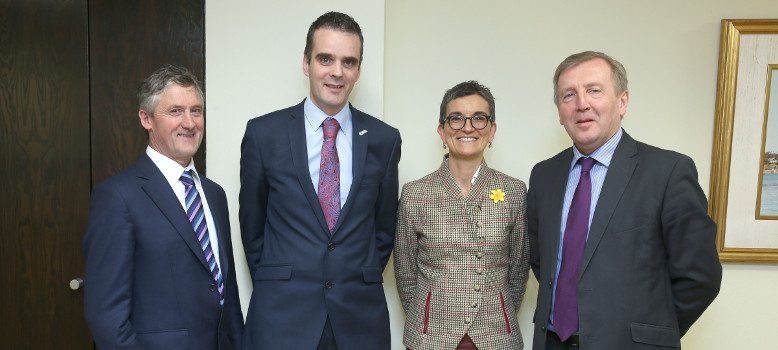Positive Engagement with Minister Creed on IFA Liquid Milk Strategy

IFA President Joe Healy has said his and IFA Liquid Milk Chairman John Finn’s engagement earlier today with Minister for Agriculture Michael Creed on the IFA Milk Wise 2025 Strategy was constructive and positive.
He said the liquid milk sector is an integral part of the Irish dairy sector whose value could not be taken for granted, and urged Minister Creed to follow up on empowering the National Milk Agency to better regulate the sector and help secure economically sustainable remuneration for specialist liquid milk producers.
“Our analysis has shown that the availability over the winter months of milk from freshly calved cows, which is the milk required for the pasteurised drinking milk consumer market, is diminishing. Volumes of fresh milk purchased under registered contracts for processing for liquid milk consumption over processors’ fresh milk sales fell from an 11% surplus in 2013/14 to just 5% in 2014/15. Since then, the number of dairy cows calved over the autumn months have fallen 15% in 2015, and by 11% in 2016, suggesting that cover over demand has fallen further. As this has happened at the same time as a significant national dairy expansion, it is clear that there are some very fundamental production pattern shifts happening, and this will have serious implications for potential shortages of fresh milk over winter months,” Mr Healy said.
“The Minister understood our point that the erosion of margins and winter premium payments, together with the opportunities to grow creamery milk production for export created by the end of quotas, is pushing liquid milk producers to switch to spring calving. Retailers and dairies, engaging in ruthless competition for a static market, have damaged the sustainability of specialist liquid milk production – none more so than through the competitive 12-month tenders some of the larger retailers insist on using to select their private label providers,” he added.
IFA National Liquid Milk Chairman John Finn added: “Minister Creed was enthused by our agreement with the National Milk Agency to carry out this year a survey of all 1800 specialist milk producers to establish their age profile, succession plans and intentions”.
“He further agreed that he would engage promptly with the National Milk Agency (NMA) to address some of the relevant issues, especially around multi-annual rather than annual contracts, the timing of their signature relative to the announcement of winter prices, and the assessment of “adequate compensation” which the NMA has by law1 to satisfy itself of before registering producer contracts. He also accepted that the NMA needed to be better able to collate data on the liquid milk market, including imports”.
“He also committed to engaging with Teagasc and the NMA on our proposal for an Observatory of Input Costs, which could inform milk price negotiations between producers, processors and retailers, as well as helping to determine “adequate compensation” for farmers,” he added.
“We look forward to continuing our engagement with the Minister and the NMA to progress all those issues, in the best interest of liquid milk producers,” he said.
Mr John Finn added: “We also intend to take up the retail-related issues in our Strategy with the Department for Enterprise, Jobs and Innovation at the earliest opportunity”.
“We need to see an end to the purely price-based 1-year retail supply tenders in favour of sustainable multi-annual commercial relationships – the fixed milk price contracts operated by most dairy co-ops for creamery milk are templates retailers who benefit from very stable market returns must engage with,” he said.
“We also need a broader ranging review of retail regulations, to reintroduce the below-cost selling ban, and to provide for a well-resourced, independent Ombudsman to stamp out unfair trading practices and secure fair prices for primary producers,” he said.
“There are other aspects to our Strategy which are relevant to dairies and retailers, and we will be following up on those with the relevant stakeholder representatives in the coming weeks and months,” he concluded.




